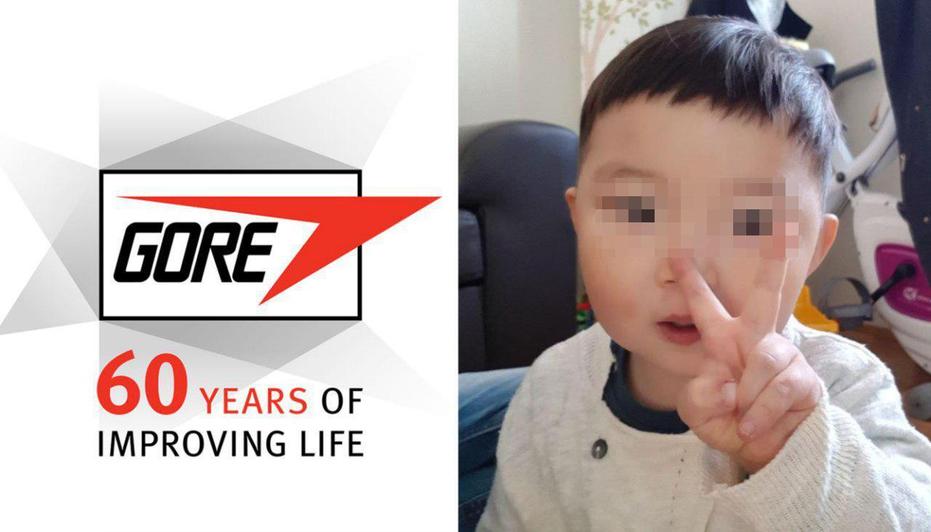 |
|
Yang Min-gyu, 3, is unable to receive a cardiac operation because Gore has stopped supplying artificial blood vessels to the South Korean market.
|
Hospitals nationwide are short following Gore’s withdrawal from South Korean market
Since birth, Yang Min-gyu’s heart has been different. Now three years old, he is only able to use one of his heart’s two ventricles, and his valves are not fully formed. His heart is unable to supply blood smoothly to the rest of his body. Taking even 10 steps leaves him short of breath; he is unable to engage in almost any outdoor activities besides walks with mother Kim Jin-hee, 39, as she holds him close to her. Because of the infection risk, he does not attend day care. The functions of his heart are also called upon more and more as his body grows – which means that he breathes with more and more difficulty and experiences less oxygen flow to his brain as he gets older. Yang had one operation shortly after his birth in March 2016, and another six months later. He had been awaiting a final operation this month to fully repair his condition. But last month, the supervising physician at Seoul Asan Medical Center said the procedure would “need to be indefinitely postponed.” The hospital had apparently run out of artificial blood vessels – an essential component for the surgery. “My son says he’s out of breath more and more, and he’s begun showing signs of cyanosis, but we can’t do anything but wait,” said Kim. The reason Yang’s operation had to be indefinitely postponed was that the medical project division of Gore, the company that previously sold artificial blood vessels, pulled out of the South Korean market in September 2017. The medical division of Gore – which is also well known for his outdoor clothing material Gore-Tex – supplies artificial blood vessels and other medical devices around the world. The reasons for Gore’s departure were twofold: declining profitability due to the low health insurance charges in South Korea, and conflicts with the Ministry of Food and Drug Safety (MFDS) that emerged during the certification process for good manufacturing practices (GMP) standards for pharmaceuticals. When Gore left South Korea, the higher-level general hospitals capable of performing surgery for congenital heart conditions – including Seoul Asan Medical Center – hurried to stockpile all the artificial blood vessels they could. But now the stock at Seoul Asan has run out. Other hospitals have only one to two remaining. Yang Min-gyu is now one of the young patients left unable to undergo an operation for his congenital heart condition because there are no Gore artificial blood vessels available. Artificial blood vessels are an essential part of the Fontan procedure, a treatment for severe congenital heart conditions. They function like a vena cava when placed in the heart of a patient with a complex cardiac abnormality. In the case of adults, other companies have products available that can be used instead of Gore’s. But standardization difficulties mean there is no alternative when it comes to artificial blood vessels for children. “If he doesn’t get surgery because they are no blood vessels available, he could die within a matter of months as his cardiac function diminishes and serious side effects occur,” said Oh Tae-yoon, director of the Korean Society for Thoracic and Cardiovascular Surgery (KTCVS). Around to 30 to 40 patients like Yang require the Fontan procedure each year. S. Korean government raises ceiling on health insurance charges for rare materials The South Korean government has taken action to develop countermeasures. On Sept. 28 of last year, the Ministry of Health and Welfare (MOHW) announcement “calculation standards for the maximum amount for rare and essential treatment materials,” which allowed for raising the ceiling on health insurance-covered treatment charges for rare and essential treatment materials. “We broadened the scope of medical charge allocation so that it can provide the full amount that Gore is asking for,” a ministry official said. An MFDS official explained, “At the time of its 2017 withdrawal, Gore canceled the MFDS approvals for its medical devices; last month, the ministry revived those approvals.” “This enabled the immediate receipt of products and sales to hospitals once Gore resumes its supplies,” the official said. In addition to the government’s efforts, patient and physician groups are also appealing to Gore. “We’ve tried sending emails to Gore and reaching out to them in different ways, but they haven’t responded,” said an MFDS official. “We’ve requested a resumption of supplies through the US Embassy,” the official added. Gore executives unresponsive to pleas for supplies Ahn Sang-ho, representative of the Korea Congenital Heart Disease Patient Group, said, “We sent a notification to Gore, but the only reply we got was that they’d ‘withdrawn from South Korea.’” “We’ve inquired with branches in Shanghai, Singapore, India and Taiwan, but either they haven’t answered or we’ve been told they can’t supply [the devices],” Ahn added. Early this month, KTCVS sent a notice to Gore Korea – another division of the company in charge of clothing sales in South Korea – demanding a reversal of the withdrawal and threatening a boycott of Gore Korea if it does not happen. In January, Gore’s northern Asia division sent a message to KTCVS to the effect that Gore could “no longer continue its medical device project in South Korea.” Gore Korea CEO Han Kyung-hee did not respond to repeated attempts by the Hankyoreh to contact him by telephone on Mar. 6. By Kim Min-je, staff reporter Please direct comments or questions to [english@hani.co.kr]






